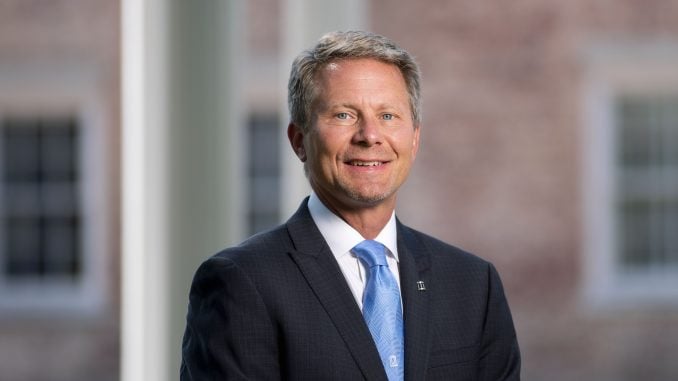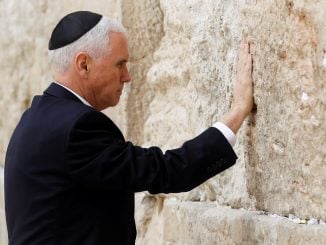
RALEIGH — The University of North Carolina at Chapel Hill issued a statement regarding remarks made by a speaker at an event on the campus praising the Hamas terror attack on Israel.
Signed by departing Chancellor Kevin Guskiewicz, the undated statement was sent to the Israel advocacy group Voice4Israel following a letter its board had sent to the school regarding the “No Peace Without Justice: A Round-Table Talk on Social Justice in Palestine” event held on Nov. 28.
According to its website, Voice4Israel is a 501 (c)(3) non-profit organization “dedicated to promoting solidarity with Israel through education and advocacy” that boasts “600 members strong and growing.”
“Oct. 7 for many of us from the region was a beautiful day,” Dr. Rania Masri said during the event. “It was the day in which we saw that, we saw our brothers, we saw our fathers, we saw men break out of a concentration camp.”
“So for many of us, the question is, how did they learn that? How did they develop those paratroopers? Where did they get those skills?” Masri went on to say “How, how, after a hundred years of having a military boot on your neck, could you still develop the technique and the resilience to literally fly? That is what Oct. 7 means to many of us. And I just want to be very frank about it and not be in the least bit apologetic of the violence of the oppressed or the occupied.”
Masri is the co-director of Organizing and Policy at the NC Environmental Justice Network.
Masri also called President Joe Biden a “racist Zionist,” and went on to state, “Let us demand the eradication of Zionism. Let us have that be our goal.”
In an email newsletter, Voice4Israel published Guskiewicz’s statement about Masri’s remarks. The email included a link to an article about the event written by Peter Reitzes at the outlet Algemeiner detailing her comments. Reitzes is also a board member of Voice4Israel.
The statement by Guskiewicz reads as follows:
Thank you for bringing our attention to your concerns about the event on November 28 titled “No Peace Without Justice: A Round-Table Talk on Social Justice in Palestine.” Upon learning of these comments, university leaders have looked into this situation and the Dean of the College of Arts and sciences is reviewing the practices and policies for how panels are organized, how we support free speech, and also host events that encourage respectful debate rather than hate.
The language of this visitor to our campus does not align with our expectations, as we do not condone support for violence or prejudice against any member of our community. While this speaker has no ties to UNC-Chapel Hill, we want to be clear that we do not stand with this view and we find it hateful and wrong. We will continue to urge members of our campus community to refrain from speech that is corrosive to the campus climate or offensive to members of our community. We have been disappointed by some of the messaging we have seen and heard in our classrooms, on our sidewalks and in social media posts aimed at members or groups in our community, and we will continue to encourage understanding, curiosity and an openness to new perspectives.
In response to the violence in Israel and Gaza, we have sent two messages to the campus community on October 13 and November 9. In those messages, we have made it clear that each of us has a responsibility to lead by example by engaging in peaceful dialogues. We want to have an environment where everyone can feel safe and respected as we demonstrate how people of different backgrounds and perspectives can come together and truly listen and learn from each other.
We must allow internal and external groups to express their opinions under the First Amendment, even views some find repugnant. Our students, faculty and staff contribute to a long tradition of vigorous debate and public engagement on our campus, where they enjoy a culture of lively exchange of ideas that contributes to better knowledge. While we do not want to stifle that debate, when students feel as though they have experienced discrimination, harassment, or threatening behavior, we encourage them to seek out campus resources including the Equal Opportunity and Compliance Office and the UNC Police. The safety and well-being of our students is our highest priority.
I want to thank you again for your message, and we will continue to work to protect the safety and security of all our students.
Sincerely,
Kevin Guskiewicz
Chancellor
The “No Peace Without Justice” event was hosted by the UNC Department of Geography and Environment, The UNC Center for Middle East & Islamic Studies, and Student Life & Leadership.
Other speakers included Duke Sociology Department’s Dr. Frances Hasso, Reverend Mark Davidson, Voices for Justice in Palestine, and UNC Chapel Hill Department of American Studies’ Dr. Sharon P. Holland. Additionally, three UNC Chapel Hill graduate students were also listed as speakers; Tara Di Cassio with the Department of Geography and Environment, Zachary Faircloth with the Department of American Studies, and Kylie Broderick of the Department of History.
Masri’s comments were not the only controversial part of the Nov. 28 event.
Near the start of the event after the speakers were introduced, a 7-and-a-half-minute video called “Gaza Concentration Camp” was shown to attendees. According to Reitzes’ report, the video was chosen by Hasso.
“The film portrayed Hamas’ massacre of Israelis as people simply going home. The film did not mention Hamas’ killing of 1,200 Israelis, taking more than 240 hostages, and raping and torturing many others,” Reitzes wrote.
Reitzes’ article also highlighted Broderick, a woman who taught a course on Israel and the Palestinians at UNC in 2021, “even though she publicly promoted the view that Israel should not exist.” That same year, Broderick signed a letter committing to promote the Boycott, Divestment, and Sanctions movement (BDS) “in the classroom and on campus.”
More recently, on Oct. 15, Broderick had tweeted, “F—k Israel.”



